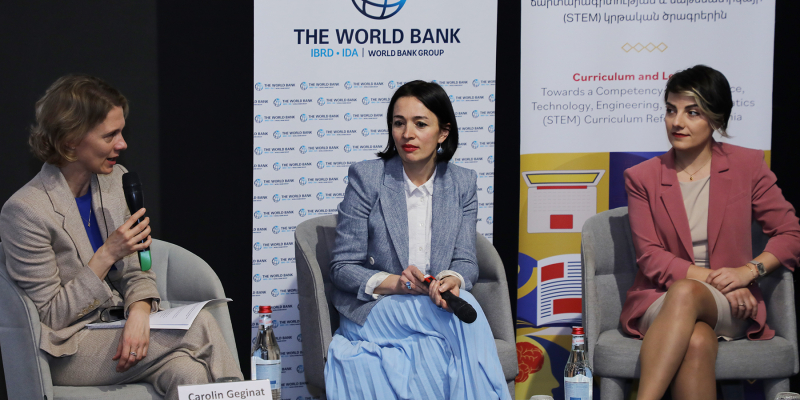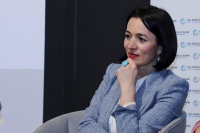RA Minister of Education, Science, Culture and Sports Zhanna Andreasyan today took part in an event dedicated to presenting the results of the World Bank study on the evaluation of curriculum reforms implemented in Armenia in STEM.
Head of the European Union Delegation to Armenia Vassilis Maragos, World Bank Country Director Carolin Geginat, ESCS Deputy Ministers Araksia Svajyan and Arthur Martirosyan, and representatives of local and international organizations attended the event.
Welcoming those present ESCS Minister Zhanna Andreasyan emphasized the significance of summarizing the work that was initiated and completed during a challenging period: “We are inspired and proud that, despite all the difficulties we have faced, we can now talk about the results. First and foremost, a huge team's work enabled us to obtain them,” said Zhanna Andreasyan and thanked both international and local partners for the work done around the development and piloting of the new state standard of general education, subject standards, and educational materials.
“Later the entire Tavush region joined these works. This is not an exaggeration: principals, teachers and other staff from all schools in the region made part of this huge work. Only enormous teamwork was able to achieve this outcome during the pandemic, the war, and the post-war period. Today's result also shows that we will not stop and will move forward, both to implement improvements and to obtain similar educational results in other regions of Armenia.”
According to World Bank Country Director Carolin Geginat, curriculum reform is one of the most challenging reforms a country can undertake: “The evaluation of the pilot in Tavush region of Armenia shows that the new curriculum for STEM subjects is giving a significant boost to learning – equivalent to half a year of learning. This reform will give the youth an enormous boost for a wide range of future career opportunities, including those in high-demand fields such as healthcare, engineering, ICT, and others.”
Head of the European Union Delegation to Armenia Vassilis Maragos stated that following the program's successful piloting, it is now necessary to develop similar concepts throughout Armenia, try to take advantage of the results of this study, and generate more prospects for advancement: “We have an excellent partnership with Armenia, and we believe in the potential of the people of Armenia. We want Armenia to be able to develop its human resources, its economy and its autonomy to further strengthen its place and position in the modern world. This requires high-quality human capital. It is impossible to achieve success without qualified specialists. Developing human capital is a top priority for us.”
The key findings of the report were presented by Senior Economist at the World Bank Renata Freitas Lemos. According to her, the World Bank study shows significant success among Armenian students due to the curriculum reform.
According to Renata Freitas Lemos, in 2018, Armenia embarked on ambitious curriculum reform in Science, Technology, Engineering, and Math (STEM) subjects, and while the reform process is still underway, assessing the progress to-date provides valuable lessons. Renata Lemos also expressed her admiration for the courage of the RA Government in implementing educational reforms during a challenging period and for underlining the importance of an independent evaluation of the executed work.
According to the World Bank study that evaluated the educational curriculum reforms implemented in Armenia and the introduction of the new state standard for general education in Tavush region, students who studied under the new program within the framework of a two-year pilot program significantly succeeded in math and science subjects, which is equivalent to six months of additional learning․
The report outlines the four key aspects behind the curriculum reform process: precise frameworks, high-quality teaching and learning materials, professional development, and learning assessment.
During the event, ESCS Minister Zhanna Andreasyan also participated in the panel discussion titled “Imagining the future of education and science in Armenia: how can curriculum reforms promote innovation and technological growth?”
“The process of implementing educational reforms hasn't paused for a second, despite all the difficulties and challenges. Reforming the general education system is the route to social development. In terms of human capital advancement, this reform is irreplaceable. According to research, our children study at school for 11.3 years: this is the time we take from our children. The educational results we provide are equivalent to 8 years. Despite several obstacles and challenges, this reform has advanced to the point where we are speaking about its outcomes for an additional six months. It is noteworthy that we are discussing this outcome in an environment where everyone is debating how many months or even years each country has lost in its school system because of the pandemic,” noted Zhanna Andreasyan stressing that this result could only be achieved through joint efforts.
During the panel discussion, representatives from the student and teacher community of Lchkadzor School in Tavush region, along with the Director of Tsakhkavan School Davit Yolchyan, discussed the outcomes of piloting and implementing the new standard of general education in the region, highly appreciating the conceptual changes and the fact that the standard is based on the skills and abilities of a student. They emphasized that the standard places equal emphasis on the student's skills, position, and value system.
Note that 76 secondary schools in Tavush region now have fully equipped Chemistry, Biology, Geography, and ICT laboratories thanks to the “EU4Innovation: STEM Pilot Activities” project.
















